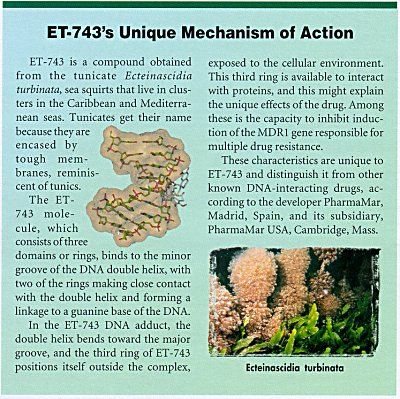ET-743, Compound From Sea Tunicate, Promising in Soft-Tissue Sarcomas
NEW ORLEANS-Results of three phase II trials suggest that ET-743 (ecteinascidin), a novel marine compound (see box at right), may have a role to play in treating certain soft-tissue sarcomas, George D. Demetri, MD, said at the 36th Annual Meeting of the American Society of Clinical Oncology (ASCO).
NEW ORLEANSResults of three phase II trials suggest that ET-743 (ecteinascidin), a novel marine compound (see box at right), may have a role to play in treating certain soft-tissue sarcomas, George D. Demetri, MD, said at the 36th Annual Meeting of the American Society of Clinical Oncology (ASCO).
We are pleased that ET-743 has a reasonably favorable safety profile and does not appear to demonstrate cumulative effects, said Dr. Demetri, co-director of the Center for Sarcoma and Bone Oncology, Dana-Farber Cancer Institute and Harvard Medical School. In our studies, he added, patients treated with ET-743 have been able to undergo multiple treatment cycles to control their disease with evolving anticancer response over time.
The three trials assessed the activity of ET-743 in three distinct groups of patients with sarcomas. In each trial, the agent was given in an outpatient setting at a dose of 1,500 µg/m² as a 24-hour IV infusion. Treatments could be repeated every 3 to 4 weeks.
In the first trial of patients with advanced soft-tissue sarcomas who had received one or two prior chemotherapy regimens for metastatic disease, 47% (14 of 30 patients) had stable disease or an objective response.
In the second study of patients with advanced soft-tissue sarcoma with no prior chemotherapy, again 47% (8 of 17 patients) exhibited stable disease or an objective response.

In the third trial, of patients with gastrointestinal stromal tumor (GIST), which Dr. Demetri described as notoriously difficult to treat, only 6% (1 of 18 patients) have shown a benefit (stable disease).
Tolerability of ET-743 has been very good, Dr. Demetri said. Nausea was essentially eliminated by incorporating dexamethasone into a prophylactic antiemetic regimen. Other toxicities in the trials included myelosuppression, temporary and asymptomatic transaminitis, and fatigue.